Fan Voices Central
Genuine Fan Perspectives on the Latest Films—Raw and Real
Must-See Favorites
Must-See Movies Everyone’s Talking About
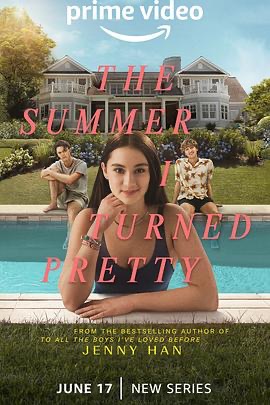
The Summer I Turned Pretty Season 1
Director:
Cast: Lola Dong, Jackie Zhong, Tom Everett Scott
Amazon has acquired the adaptation rights to Jenny Han's YA novel *The Summer I Turned Pretty* (another work by the author of *To All the Boys I've Loved Before*) and is preparing to turn it into an 8-episode series. The author herself will be responsible for writing the script for the first episode. *The Summer I Turned Pretty* is a multi-generational drama that includes a love triangle between the female lead and two brothers. It also delves into the relationships between mothers and their children, as well as themes of female friendship.
Read Full Review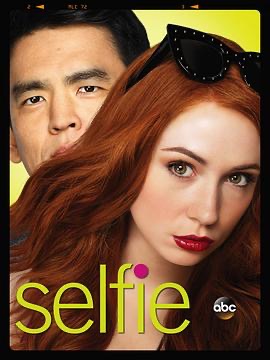
Selfie
In real life, Elisa (Karen Gillan) is quiet and unnoticed, and no one would ever imagine that such an inconspicuous and unlikable girl is actually a virtual world sensation with hundreds of thousands of fans. The reason for this can be traced back to a viral video that made her famous online, but for Elisa, it’s not exactly a good thing. One day, Elisa realizes that even though she has thousands of "fans," in the real world, she is still alone. So, Elisa turns to her market-savvy colleague Henry (John Cho), asking for help in "rebranding" herself in real life. Henry is unlike any man Elisa has met before, and with his help, will Elisa be able to leave the "internet" behind and return to "human society"?
Read Full Review
Kyuka: Before Summer's End
Summer time. A family of three, single father Babis and his nearly adult twin children, Konstantinos and Elsa, take a family boat to Poros for vacation. While swimming, sunbathing, and making new friends, Konstantinos and Elsa accidentally run into their biological mother, Anna, who abandoned them when they were babies. This encounter will stir up Babis's long-held resentment and lead to a bittersweet journey of growth for everyone.
Read Full ReviewAll Fan Reviews
From blockbusters to indie films, explore honest fan reviews here.

The Summer I Turned Pretty Season 1
Director:
Cast: Lola Dong, Jackie Zhong, Tom Everett Scott
User Rating: 7.4/10 (29629 votes)
This show is absolutely incredible, isn't it? It's such a perfect sweet drama, totally a "good-for-you" main character, and I haven't seen something this enjoyable in a long time. Every episode is great, and even though some parts seem a little far-fetched, they still feel believable. At first, I thought the main character was going to end up with all three guys, but she got to experience all of them. Here, I don't mind the polyamory! I originally liked the second brother the most, but by the end, I just thought, loving yourself is the best. Men really don't matter. "Guys may come and go, but the best friends are one in a million." The most touching part of the whole show was the friendship between the women. The relationships between the mothers and their daughters, the arguments and sharing between the female lead and her best friend, are all even more precious than love itself. Apart from the main character's brother, I really liked every character, so let's talk about them one by one. The brother, I couldn’t stand him from the beginning. There was nothing to like about him—he exposed the female lead's past, mocked her, and later interrupted her romantic relationships. I really couldn’t stand him. He’s a hypocrite too: messing around with the female lead’s best friend, but when it comes to his sister dating, he says it's disgusting. It’s such toxic masculinity! But luckily, it’s a fun drama, so he got what he deserved in the end—lost all his money to gambling, and the girlfriend he had wasn’t really into him. The second brother warned him about it, but he didn’t listen. I was just wishing for more of this show, and then I found out there might be a second season. I think in the second season, the brother will probably get dumped. As for the female lead, she’s absolutely living her best life, huh? She was first flirted with by the supermarket guy, then they ended up at the beach and started dating. He was so sweet and thoughtful—like the perfect second male lead from a novel. He helped the female lead get over awkward situations, but she still had feelings for the eldest brother, of course, because she liked him since she was ten. But when they broke up, he was totally supportive of her and her true love. That kind of relationship is just perfect—no obsessive clinging, only letting go, because true love is about freedom. Then there’s the second brother. The hottest in the show, definitely. With that fishing net vest, he’s the pure wild boy—tanned, muscular, full of masculinity, so sexy! And those big eyes—such exotic charm. The only issue is that he swings both ways, which I’m still trying to accept. Finally, the eldest brother. He’s so hot and cold; honestly, he’s the one I like least and don’t think is a good match for the female lead, but she loves him! In the end, he had to chase her back, which was a little painful, but I guess it fulfilled the female lead's wish! He was also worried about his mom’s illness the whole time. The fear of losing her led to a panic attack, but thankfully, the female lead's mom's partner helped him. If the female lead's mom and the writer ended up together, they’d be a family—nice! But in the last episode, it seemed like the female lead’s mom might get back together with her ex-husband. But none of this explains why he treated the female lead the way he did. Honestly, he’s even worse than her elementary school classmate.
Read Full Review
Selfie
Director: Comedy
Cast: Karen Gillan, John Cho, Sam Levin
User Rating: 8.5/10 (58586 votes)
The line from the male lead in *Selfie* is correct, social platforms are like little nails, flirting with everyone. Then you get a new self from the countless likes and comments, either inflated or diminished. When you gain something, you are also losing something... You post all your emotions and life details online, but in the real world, you lack normal interpersonal relationships, or you think you're not good at socializing. You treat strangers online as close friends, confiding in them, but it has no meaning for your growth. You spend a lot of time interacting, but neglect learning and other things, causing disappointment in others in real life. Every day, we see various people on social platforms, constantly posting photos, constantly showing off, constantly wanting to get more and more likes. Unfortunately, when this really becomes part of your life, you are controlled by social platforms. Meeting in person is not as warm as chatting on Weibo or WeChat. #HeadDownCulture# *Selfie 01* Waiting for bilingual subtitles, just updating the lines and some feelings XD
Read Full Review
Kyuka: Before Summer's End
Director: Drama
Cast: Elsa Lekakou, Konstantinos Georgopoulos, Simeon Tsakiris, Elina Topalido, Stathis Apostolou
User Rating: 7.1/10 (948 votes)
The square frame cannot contain the overflowing blue waves at the end of summer in August and September. There are too many ambiguous backgrounds and too many vague words. Only the real emotions and silent blanks revealed by the words and interactions can make people resonate with them. The father, who is both a father and a mother, took his twin children on a sailboat to a beach where he often took them when they were young, and also went to see his ex-wife whom he had not seen for many years without the children's knowledge. God knows how excited and expectant he was on this day, but he still guarded his pride as always, arguing with her half-heartedly, and carefully handed over the USB flash drive he specially prepared with the children's video recordings. He wanted her to know how he had diligently raised the children during her absence. Although his ex-wife broke her promise after seeing him, he still invited her family to his boat by coincidence, and had dinner with the children - they ate the fish he caught with his superb fishing skills. Another fisherman, his ex-wife's husband, who was also good at fishing, exposed him and said that all the fish were bought from the market. His last sense of honor was punctured, and his broken marriage experience, the parent-child relationship that could not be honest with each other, and the fact that he could not catch any fish made him sink into the sea with his boat in vain. The only lifeless dead fish caught by his daughter on this trip was actually the fisherman himself. As for the close twin brother and sister (or sister and brother), except for a turtle of the same age as themselves, the memory of their mother has long disappeared. The mother is absent, the father is taciturn, the two are partners, laughing and playing, with a single-parent family history that is not worth mentioning behind them and a useless youth that knows nothing in front of them. They are the brownies that are bitten into the mouth and then spit into the sea in disgust, the broken shells picked up by a five-year-old girl on the beach, and the deflated rubber boat without a shore in the Saronic Bay in the western Aegean Sea. Although they had stopped asking about their mother's whereabouts, when they realized that the woman in front of them was her, they waded across the shallow sea and tried to climb ashore on the boat called mother. The younger sister finally gave the boat ticket to the older brother. She thought that this older brother who liked skirts and nail polish should be more liked by the mother who still had charm. On the last day of summer, with a bright moon hanging high in the sky over the Saronic Bay, one ship set sail and another was fished out.
Read Full Review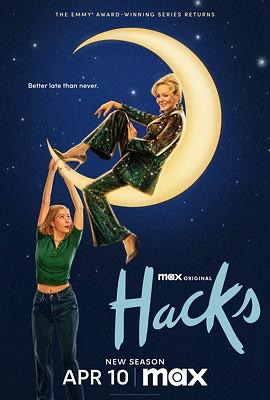
Hacks Season 4
Director:
Cast: Jean Smart, Hannah Einbinder, Paul W. Downs
User Rating: 9.1/10 (7588 votes)
I originally thought that by Season 4, they’d finally move things forward and stop tiptoeing around whether the two of them are in love. But nope—Season 4 completely fell apart. So here I am again, retracing the romance arc… A lot of people were moved by Deb’s gaze during the first taping, but that look was a callback. So let’s rewind to that final gaze at the end of Season 2. That night, when Deb was surrounded by a crowd, bathed in stardust, the center of everyone’s attention—in that moment, the only person she could see was Ava. She wasn’t even especially happy about the success of her special. What she noticed instead was that Ava, in chasing her own career so intently, had let her own ambitions fall by the wayside. So, in the middle of all that noise, Deb walked up to the rooftop alone, looked out over the “great lands” of Los Angeles, and made the painful decision to “send her away.” And Ava—well, that really is how she was. Before Deb, she’d lost her job over calling out a closeted homophobic senator by recklessly attacking everyone. Then she shamelessly asked for help from people who clearly didn’t care for her. But after meeting Deb, all she could see was Deb. She completely ignored the advocacy and voice she used to be so passionate about. These two are basically a couple already—except they haven’t had sex. She stares at her through fire. She runs to her at the edge of a cliff. If that’s not love, then what is? Season 3 had so many moments like this. No matter how chaotic the crowd, Deb always notices Ava. And even though Ava has so many better career options, she always chooses to come back to Deb. Especially the ending! Because Season 4 opens with them popping champagne together, we can confirm that in the Season 3 finale, Ava staying to compete for the head writer position was *not* out of revenge. The best revenge would’ve been to leave and watch Deb’s career crash and burn. So the true ending of Season 3 is this: Ava, heartbroken and ready to leave, suddenly realizes—while picking up that champagne in the convenience store—that Deb is deeply, deeply lonely. And she decides to stay. Even if it would upset Deb, she chooses to stay and protect her. To protect the Deb who was left opening a bottle of champagne all by herself. That’s why she held onto that bottle—waiting for the chance to open it *with* Deb. Even if we ignore all the other details—just the moment of that shared champagne and the gaze during the first taping—that kind of persistent tenderness, that single-minded focus on healing the other’s wounds… if *that’s* not love, then what is? Their story is not about "you are me" conflicts—it’s about how two strangers, through inevitable friction, come to understand, trust, and protect each other. (Underline that.) In short: this is exactly how romantic love typically develops. Now, if some people insist that if they haven’t had sex, it’s not love—that love must involve sexual attraction—I suppose I can understand that. Everyone’s different. Mutual respect and all. But even if you step way back and say: okay, let’s call this Platonic—between two unrelated people with no pure benefit-driven relationship—such deep understanding and protection? That still makes perfect sense. So can we *please* stop with the “it’s not love, it’s just a mentorship” or “that interpretation is so basic/cheesy” takes? Two women with a large age gap being automatically reduced to mentor-mentee or mother-daughter is what’s actually tired, actually clichéd. (Personally, I feel like people who can’t stand others reading love into this dynamic—*in this show specifically*—are either homophobic, or more likely, lesbophobic. And that’s honestly just heartbreaking.)
Read Full Review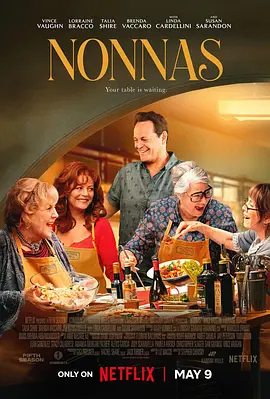
Nonnas
Director: Comedy
Cast: Vince Vaughn, Susan Sarandon, Linda Cardellini, Lorraine Bracco, Talia Shire, More...
User Rating: 7.1/10 (785 votes)
Overseas reviews: The film has outstanding advantages. The wonderful performances of veteran actors make the characters vivid and lively. The food scenes are tempting and convey the food culture. The theme is warm and profound. However, there are also shortcomings. The romantic subplot is old-fashioned and the stories of supporting characters are not explored enough. Overall, viewers who like warm comedies and food culture should not miss it. When watching, they can focus on the actors' performances and the emotions behind the food.
Read Full Review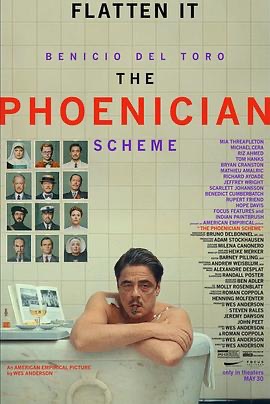
The Phoenician Scheme
Director: Drama, Comedy, Action, Thriller, Crime
Cast: Benicio del Toro, Mia Seppleton, Michael Cera
User Rating: 6.9/10 (2240 votes)
This is Wes Anderson's darkest film to date. If *The Grand Budapest Hotel* is the closest Wes Anderson has come to Spielberg, then I think *The Phoenician Scheme* can be seen as a fusion of 10% David Fincher and 5% Bergman. It's brilliant, exciting, with a touch of poignant tragedy, sadness, and reflections on life and death. Of course, by "dark," I mean Wes Anderson's kind of dark—similar to the grim tales in the Brothers Grimm. For example, Bluebeard dismembering his wives and hiding them in locked rooms. Similarly, the protagonist, Anatole “Zsa-zsa” Korda, is suspected of having murdered his previous three wives. He is, by all worldly standards, a bad man: manipulating markets, colluding with officials, royalty, and underworld forces, selfish and ruthless, constantly amassing wealth, making countless enemies. Every day, people attempt to assassinate him or poison him, but he always wakes up from unconsciousness, repeatedly coming back to life. He’s a bad man, but perhaps the reason is that he was never really loved as a child. This film tells the story of his final desperate efforts alongside his daughter Liesel for his grandest industrial project, *the Phoenician Scheme*, and his commercial empire. It’s also a story of him finding inner love and reconciling with himself and the world. Wes’s characters are always strange and exceptional. Zsa-zsa is a bad man, but he’s incredibly charming and lovable—he's dangerous, cold, and cunning, yet occasionally, you catch glimpses of the vulnerability and sadness hidden beneath his cold exterior. When he wakes up after another assassination attempt, sitting in a bathtub covered in wounds, eating scrambled eggs, reading, smoking, and drinking champagne, what you feel is a certain sadness, helplessness, and tragic beauty. Almost every Wes Anderson film has that one scene that takes your breath away. In *Isle of Dogs*, it’s the stop-motion sushi scene; in *The Royal Tenenbaums*, it’s Margot stepping out of the car in slow motion; in *The Darjeeling Limited*, it’s the three brothers abandoning their exquisite Louis Vuitton suitcases and running to catch the train. In this film, it’s the opening shot of Zsa-zsa in the bathtub, recovering from his wounds. I could watch that slow-motion scene ten times: in a beautiful, luxurious, brightly lit bathroom, surrounded by nurses in white, coming in and out, he sits in the tub, wounded, reading, eating scrambled eggs, smoking, and drinking champagne. The opening credits slowly change, the colors of the letters beautifully complementing the patterns of the floor tiles. At the press conference after the film premiered at Cannes, Benicio del Toro shared the story behind shooting this scene. He said, "Wes told me, 'You sit in the tub, the nurses will come in and out, they’re just doing their thing. You are going to eat, read, smoke. I am shooting in slow motion, but you all have to act really fast.'" Benicio was confused: "Why use slow motion if we’re acting fast? Wouldn’t the result be the same if you shot it normally?" But after seeing the final cut, he realized that it truly made a difference—Wes was right. He said, "I saw it on the big screen for the first time yesterday. It’s mesmerizing." Wes Anderson is a genius. No one else can achieve the level of detail and beauty he brings to the camera. Right now, I fondly imagine that experiencing the visual beauty of Wes Anderson’s films for the first time is akin to experiencing certain art masterpieces—it expands your perception of beauty. You think, "Wow, I didn’t know such beauty could exist." Having someone like him present his world to us is a true blessing. Zsa-zsa has a line in the film that exudes the "I’m teaching my son" tone: “Never buy good pictures. Buy masterpieces.” Some of the oil paintings in the film, including surrealist Magritte and impressionist Renoir, are real works of art. They were lent to Wes by curators from a European museum. That’s the charm of Wes Anderson. These paintings were borrowed for free just to appear in the film for a few seconds. They were carefully transported to the set, filmed, and then returned to the museum, all for the few moments they spend on screen. Naturally, Zsa-zsa, this villain, wouldn’t have a beautiful and sinister palace without a few world-renowned paintings. The homes of Russian oligarchs probably have Rothko and Picasso on their walls. I really like this film. To me, it’s even better than *The French Dispatch* and *Asteroid City*. Compared to them, *The Phoenician Scheme* has more obvious dramatic conflict and stronger storytelling. Zsa-zsa and his daughter Liesel’s journey of visiting various tycoons and renegotiating terms is like a video game, leveling up through different bosses. It’s even a bit like *Journey to the West*, but these monsters are even funnier, especially with big-name stars like Tom Hanks and Scarlett Johansson playing them. In this video game structure, Benedict Cumberbatch’s Uncle Nubar is the ultimate boss at the final stage. You must watch his portrayal, especially his eyebrows—they’re biblical. Maybe I sound a bit heavy in my writing, but the film is really funny! Wes Anderson’s humor is hard to explain. The funniest character is the entomologist tutor Bjorn, played by Michael Cera, with his "Oslo" accent. This reserved, elegant Nordic academic, after drinking three beers, asks Liesel, “Can you imagine yourself falling in love with a man like me, hypothetically speaking?” Michael Cera seems like the perfect fit for Wes’s films. Tom Hanks and Bryan Cranston as the "Sacramento Consortium" are also hilarious, especially Bryan Cranston’s basketball moves—they’re a work of art. Richard Ayoade’s portrayal of the rebel leader, spraying bullets in a nightclub while speaking with a crisp RP British accent, is an absurd and delightful contrast. The familiar elements and emotions from his previous films still shine through: extreme elegance, luxury, and beauty, always contrasted with a sense of loneliness, alienation, and unspoken sorrow. There was once a fan exhibition inspired by his films, called *Bad Dads*. Zsa-zsa in this film is a *bad dad*: his nine sons are housed in the same dorm across the street, while his only daughter is a nun in a convent. If Zsa-zsa hadn’t realized that he might die from an assassination attempt, he would never have called Liesel. He hadn’t seen her in six years before that. Though he names Liesel as his only heir, it’s “on a trial basis,” just like he has eight sons but still adopts one because “maybe the adopted one is the smartest?” As a father, Zsa-zsa is like Royal from *The Royal Tenenbaums* and Zissou from *The Life Aquatic*. Royal always introduces Margot with, “This is my adopted daughter, Margot Tenenbaum.” However, by the end of the film, these fathers usually soften, becoming more peaceful and tolerant. They’ve spent their lives fighting with the world, uncompromising and lonely, but in the end, they complete what they were meant to do—reconciling with their children and the world in their final moments. His films are like fairy tales for adults. The character of Zsa-zsa is based on the father of Wes’s wife, Juman Malouf. He’s Lebanese, an engineer, and a businessman. I imagine he might be one of those old-school Middle Eastern businessmen—silent, sharp-eyed, and intimidating. Wes says, "I was a little afraid of him at first. One time he said to me, 'I only work with lions. Do you have lions?' If you go to a restaurant with him, you’ll get special treatment. My father-in-law would order the waiters, 'Move this table over there. We’ve been waiting too long!' And they would obey. I’ve never had anyone treat me like that." The father-daughter relationship in this film is very complex—distant yet touching. Wes’s previous films also featured father-child relationships, but this one places the most emphasis on it. I think it stems from Wes’s own feelings about his relationship with his daughter. He and Roman Coppola co-wrote the story, both having one daughter each. In his recent films, the elements of religion and death have become more prominent, adding weight, mystery, and a certain reverence to the films. I think this reflects Wes’s own thoughts on aging and death as he turns 56. The black-and-white segments in the film, which seem like a judgment before entering heaven, are dreamy and like a review of one’s life or unresolved emotions. I think these black-and-white scenes are especially striking, and the cameos by actors like Willem Dafoe, Charlotte Gainsbourg, and Bill Murray—who look like ghosts from an absurd dream or ancient gods from myth—are truly captivating. Of course, though I’m speculating on Wes’s thoughts about aging and death, he still looks twenty years younger than his age. When *Isle of Dogs* premiered at the Berlin Film Festival in 2018, I saw him on the red carpet, and his posture and appearance were like that of an art-school student who likes to daydream. The film’s score is modern, using Stravinsky’s *Firebird*. This time, Wes changed cinematographers. He had worked with Robert Yeoman from his first film *Bottle Rocket* all the way through ten films. This time, however, he worked with a new cinematographer. I was initially concerned, but after watching the film, I couldn’t tell the difference. What does this say? Wes’s personal style is so strong that it’s instantly recognizable, no matter who’s behind the camera. Overall, I think this is Wes Anderson’s most different attempt so far, but I understand why some people still see the same Wes Anderson in this film. He often says, “Every time I make a film, I feel like I’m trying something very different, but when the trailer comes out, people say: 'Wes Anderson’s style is more recognizable than ever!' (laughs)." I think I’m seeing a tendency toward transcendence in his work, reflecting his inner evolution as he approaches his later years. Maybe, eventually, Wes will follow Bergman, leaving the world behind.
Read Full Review
Sinners
Director: Drama, Action, Thriller, Horror
Cast: Michael B. Jordan, Hailee Steinfeld, Miles Keaton
User Rating: 7.7/10 (39618 votes)
It might be, no, *definitely* the best horror film of the year. So overwhelming, so crazy. The historical background is just fragmented, pieced together in bits and pieces, but while watching this film, there’s a deep, sorrowful, painful feeling that settles in. It's like you understand what it's trying to say. In most horror films, the monsters are terrifying and chilling, but there are several moments in this one when you even begin to think the monsters have a point? You can’t help but be confused, tempted to accept their view. The dead aren’t truly gone—they’re from the past. The beings outside the door aren’t terrifying, ominous monsters, but rather loved ones, close friends, the most important people in your life. You want to cross over and join them. Become a part of an intimate family bond, with a connection that lets you understand each other’s memories deeply (in reality, it's the manipulative creator taking their lives and stories, using ghosts to deceive others and steal even more). You have to convince yourself that the emotions being shown are deceit, a lure to get you to give up your life… but is it *just* deceit? The core of the film is a bit like *The Mountain of Madness*. A group of people goes on an expedition to the snow mountains, and one night, while you're alone in a cabin, your lover appears and tells you that the others died in an accident, and later, your teammates appear and say your lover was the one who was possessed… who do you believe? Which side do you choose? The question is, what if the one standing outside the door is the person you can’t bear to part with? Even knowing they’re a monster, they confess that they will turn you into one too, to live freely together, sharing memories and the night sky. You just have to pay a small price, like giving up your human identity, never walking under the sun again… and they’ve already died, irreversibly becoming a monster. Would you go? Cross the boundary between the ordinary and the extraordinary, and walk toward the monster? To become a creature abandoned by the sun together. At first, I thought only the creator’s will was manipulating things. The monsters that were transformed had no thoughts of their own, no "soul," simply the cunning creator who steals memories and imitates the victims’ personalities, deceiving those who were closest to them into trust. If that were true, there’d be no hesitation, no doubt. You’d want to kill the creator immediately, and bury the desecrated bodies. But the longer you watch, the more astonished you become. It seems that becoming a monster offers a different way of thinking, something that’s distinct from human thought. But the tone, the habits of the speaker, and even the urgency of their killings take on another meaning. “Hurry, join us. Stay with us as a close family.” The deceased who were executed by the stake couldn't complete their transformation. So, their cries and howls became filled with true, raw pain. It felt as if they were genuinely sorrowful, devastated, and disrupted by "stupid" loved ones stubbornly clinging to their human identity, ruining the whole beautiful plan. The witch has firm faith, believing souls will reunite on the other side. The lover faithfully follows her will, but hesitates, wavers, and ultimately lets go of the blood relative he could not harm. An unbearably tragic night. Some stumble on, surviving as humans. Others, two outcasts, flee together, support each other, and somehow manage to live a relatively decent few decades, fulfilling unachieved desires. Even vampires love blues. Music that’s enough to summon demons... In the cheerful, jumping melodies and eerie, melancholic songs, even ordinary zombie forms become rhythmic. That golden, beautiful night, I was still puzzled about how the bar had suddenly been set up. The scenes weren't explained, only to be revealed later when everything had been destroyed in chaos. Those fleeting, interwoven images. Maybe there were never any vampires. Maybe it was an attack in an unguarded moment of joy. Maybe it was all completely man-made destruction. The only one left alive, a young man, walks out, bathing in the first light of dawn. Decades later, he turns the story into a fantastical, modified tale. But wouldn’t that be boring? It wouldn't fit such a beautiful night, such a brief, fleeting moment. They were still discussing how to use plantation vouchers to make back their expenses, still seriously studying the accounts and spending for the next two months. Let's stick to the vampires. Take away all those unforgettable people, the cousins of local legends, the girl he fell in love with at first sight, the musical partner, the familiar and unfamiliar residents of the small town. Take away their living breaths and blood-tinted faces. Leave behind the guitar gripped tightly in the young man's hands, and the scars on his face. Let him wander, not to waste this life he picked up. He must preserve his own memories and stories. He must exist as "human."
Read Full Review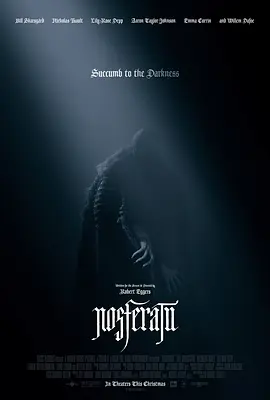
Nosferatu
Director: Suspense, Horror, Fantasy
Cast: Lily-Rose Depp, Nicholas Hoult, Bill Skarsgård, Aaron Taylor -Johnson, Willem Dafoe, Emma Corrin
User Rating: 5.9/10 (11524 votes)
This weekend I came across the horror movie "Nosferatu" that was recommended to me before the Spring Festival. I didn't expect it to be an award-winning movie in Hollywood this year. The movie tells the story of Alan who summoned a ghost as a child and ended up being possessed by it. When he grew up, he married a young real estate agent, Thomas. In order to make a living, Thomas was arranged by the company to go to an abandoned castle to do business with Count Nosferatu. He met the mysterious and terrifying Count Vampire and fled the castle in a hurry. Unexpectedly, the Count Vampire had arrived and caused a plague in the town. He and his wife, together with the professor they invited, began to try to eliminate the Count Vampire. The story framework setting basically replicates the horror narrative of the return of the vampire Count causing the spread of plague in the old movie "Nosferatu" in 1922, and is mixed with the Count's obsession with his new wife in "Bram Stoker's Dracula" in 1992, and then innovatively adds the desire-driven nature of today's trendy female subjectivity. In the end, the movie ends with the Count's terrifying desire gaze at the heroine Ellen, and Ellen, as the subject of desire, is hesitant to speak but easily kills the Count in the end, resulting in a split in the viewing experience. This movie wants to maintain the same Gothic style as the previous one - dim environment background, plain clothes, and towering gloomy castle. Although the atmosphere is well set, the unique aesthetic details of Gothic are not refined enough. The gloomy castle is only left with light and dark silhouettes, making the movie look like a horror shell. As for Depp's daughter Lily, who plays Allen, I personally feel that she is not suitable for this role. Her body shape is not suitable for playing the peerless beauty praised by the real estate boss; and her temperament is rather wooden. She does not have the fragility and confusion of Winona Ryder in "Bram Stoker's Dracula", nor does she embody the tension of female subject desire, only the hysteria when she is possessed by ghosts. The female characters lack flavor, and the male characters are not portrayed accurately. Nicholas Hoult, who plays the newlywed husband Thomas, is middle-aged but not mature enough, so he is suitable as a husband without sex appeal in the movie, but his appearance lacks the Gothic style. And Count Nosferatu in the movie has become a hairy monster, which is also not Gothic. Of course, these are minor flaws. The most serious problem of the film is that the expression of desire is too direct and fragmented. At the beginning, the heroine Ellen summoned the vampire lord because of desire, and then she was in a panic. During this period, the film directly expressed the desire through the wanton flirting between her husband's friend and his wife. Then the newlywed wife directly asked her husband for sex to express her true love for her husband and rejected the vampire lord's sexual request. So the desire either did not appear or was so obvious that it blinded the eyes. Only the detail of the naked girl riding a horse towards the depths of the fog in the middle of the movie was meaningful. At the same time, the movie constantly emphasizes that the Count is powerful. He can control the real estate owner to become his accomplice, and can spread the plague through his coffin. But in the end, Allen kills the Count directly by having sex with him. It can be said that dying under the peony flower is unjust as a ghost! It can be seen that the powerful ability of traditional vampires in the movie is ultimately no match for the powerful consciousness of modern women, and the adaptations that are not beautiful outside the movie have won consecutive photography awards. It turns out that Hollywood movies are gradually regressing!
Read Full Review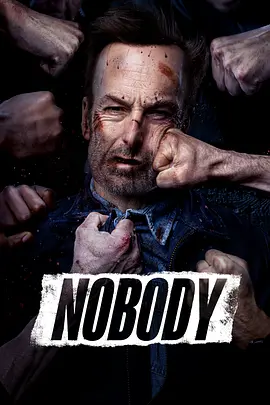
Nobody
Director: Action, Crime
Cast: Bob Odenkirk, Alexi Serebryakov, Connie Nielsen, Christopher Lloyd, Michael Ironside, More...
User Rating: 7.8/10 (186482 votes)
"Little People" is a crime action film released in 2021, directed by Ilya Naishuller and starring Bob Odenkirk, Connie Nielsen, Alexi Serebryakov and others. The film tells the story of the protagonist Hutch (Hutch Mansell), a retired agent killer who longs for a peaceful life, but in order to protect his family and children, he has to get involved in gang disputes again. I was deeply impressed by this movie, especially its portrayal and understanding of "little people". People who struggle at the bottom of society are often overlooked, and this movie is a loving tribute to them. The character of Hutch made me see the helplessness and tenacity of an ordinary person in the face of life pressure and danger. Although he was a top agent, after retiring, he just wanted to live an ordinary life. However, for the safety of his family, he had to wield his weapons and become the "nobody" again. The action scenes of the film are very exciting and exciting, which makes people sweat. The acting is also excellent, especially Bob Odenkirk, who successfully portrays a character with both wisdom and courage. In addition, the film's music and photography are also very good, creating a depressing and tense atmosphere for the film.
Read Full Review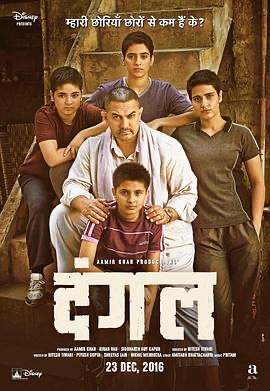
Dangal
Director: Drama, Family, Biography, Sports
Cast: Aamir Khan, Fatima Sana Shaikh, Sanya Malhotra
User Rating: 9.0/10 (1699486 votes)
In the 2016 Rio Olympics, Joseph Schooling defeated Michael Phelps to win Singapore's first-ever gold medal since its founding. While Olympic gold medals may seem ordinary to us, in Singapore, a country with only five million people, Schooling became a national hero. After returning home, Singapore organized a victory parade for him. Schooling stood at the top of a double-decker open bus, which slowly made its way through Singapore's main roads. Crowds of people lined the streets, many even running behind the bus as it passed. This level of attention and national pride reminded me of only one other event in Singapore's history: the passing of Lee Kuan Yew in 2015. Just like Schooling’s victory parade, Lee Kuan Yew’s funeral procession slowly passed through the streets, with crowds of people watching. However, the difference was that while we were bidding farewell to one hero, we were welcoming another. What impact did Schooling’s gold medal have on the country? First, it brought joy to Singaporeans for an extended period, almost like a festive celebration. Secondly, it’s said that every youth swimming class at swimming pools was fully booked, especially butterfly stroke classes, since Schooling won the gold in the 100m butterfly. The power of an idol! Most importantly, a new voice and a growing awareness quietly emerged among the Singaporean public: Singaporeans too can win Olympic gold! Suddenly, people felt that the gold medal was not so out of reach. However, this belief, this awareness, was something Singaporeans had waited 51 years to embrace. Despite being a wealthy country, Singapore's investment in sports has always been generous. To motivate athletes to win medals, the government has never hesitated to spend money. In comparison, Chinese Olympic gold medalists are only awarded about 200,000 RMB in 2016, but in 2008, a Singaporean table tennis athlete who switched nationality from China received nearly 4 million RMB for a silver medal. Even with such generous incentives, Singapore had never seen a medal won by a local athlete until 2016. Olympic athletes are chosen from the best of the best, and with Singapore’s small population base, the pool to select athletes is limited. But the athletes selected aren’t necessarily lacking in physical ability. The Olympic Games feature 28 sports, and if an athlete is not strong in athletics, they can try gymnastics or aquatic sports. There’s always a sport where they can make a mark based on their country’s and ethnicity’s characteristics. Singapore has produced outstanding athletes, but when it came to winning international medals, the key factor was a lack of confidence. This long-standing “I can’t” mentality couldn’t be broken until Schooling’s victory. Imagine that even a country like Singapore, which had everything in place, needed 50 years to develop the “We (too) can” mentality. This speaks volumes about the challenges a country like India faces, with even more complex and difficult conditions. According to Wikipedia, India does have Olympic gold medals, though they are few and far between. In the past decade, India only won one gold medal in men’s shooting at the 2008 Olympics. Why? The people of India don’t seem physically weak. The country’s warrior caste, the Sikhs, has always been known for their military prowess, especially in terms of strength. But India still hasn’t won Olympic gold. This can be attributed to two major factors: cricket’s dominance in India and the country’s gender inequality. Cricket in India is not just a sport; it’s the national obsession. Young boys with strong physiques often start training for cricket early on. In India, cricket players are like Bollywood stars, and reaching the top in cricket guarantees immense wealth and fame. The public cares only about performance on the field, not your social background. Cricket has thus become a means for many boys to escape poverty. On the other hand, other sports, lacking government support, media attention, and public interest, have seen fewer athletes pursuing them. While men flock to cricket, Indian women athletes are quietly rising. At the 2016 Rio Olympics, India won only two medals, a bronze and a silver, both thanks to women athletes excelling in badminton and wrestling. More and more Indian women are now entering professional sports. This brings us to the topic of women’s status in India. In truth, we know very little about India and often hold biased views based on limited information. The common image is one of frequent news about sexual assaults, high dowries, and women being confined to serving their in-laws with no freedom or voice. We might even think India is still stuck in the past, but this is not the full picture. These issues do exist in India, but they don’t define the entire country. This is like how Western media once portrayed China based on rural practices of “bride price,” which led to the misconception that China was backward. The reality is that, while some rural areas in China still have such practices, they’re not representative of the country as a whole. India's historical and cultural context is vastly different from China’s. India’s unity is much lower than China’s. Since ancient times, the Indian subcontinent has been home to numerous independent kingdoms, each with its own language and culture. These kingdoms evolved into the modern Indian states. Historically, these regions have differed greatly in terms of geography, religion, and culture. It’s this diversity that makes India one of the most diverse countries in the world. Understanding India requires recognizing this complexity, which is why generalizations are not useful. In the northern part of India, the culture and politics have been more influenced by Islam, including teachings that subordinate women. In contrast, the south, less impacted by Muslim rule, remains more progressive in terms of gender equality. Historically, women in India had more equal rights during the Vedic period, but over time, with the rise of other civilizations and the influence of Islam, their status declined. Although India’s economy has developed rapidly in recent decades, the modernizing cities are still few and far between. Urban women generally have higher education and enjoy equality with men in social standing. India has even had a female prime minister, Indira Gandhi, and many influential women in business and industry. But the situation is still grim in rural areas, particularly in the north, where education is scarce, and traditional views persist. Some areas still have child marriages, and families face heavy social pressure against women pursuing careers in professional sports. This is why the father in *Dangal* had to resist societal pressure to train his daughters in wrestling, and why it was so groundbreaking for rural girls to enter professional sports. It’s not just about breaking through traditional gender roles but about showing that “we too can” achieve something big. After the 2016 Rio Olympics, India began to reflect deeply on its performance, especially since it only won two medals despite its huge population. This contradiction between the country's economic rise and its poor showing in sports has spurred a national desire to prove itself in global competitions, a desire that *Dangal* captured perfectly. The film became a source of national inspiration, igniting the hopes of millions who want to show the world what they’re capable of. Celebrities with a sense of social responsibility have a real role to play here. As for the actors, it’s already well-known that Aamir Khan, at 51, went through an inspiring transformation to play the father in the film, gaining and losing weight. He was not alone—his four young co-stars, who played his daughters, also impressed. The one who played the second daughter was particularly memorable, with her chubby face and always-confused expression. After watching the film, I immediately searched to find out whether the actresses were amateur wrestlers or professional actors because the wrestling scenes were so realistic and high-level. I was surprised to learn that all four actresses were just actors. To prepare for the wrestling scenes, they underwent nine months of intense training, six days a week, at an Olympic-level standard. Truly impressive! It’s a far cry from the typical star actors who rely on CGI or stunt doubles to earn money.
Read Full Review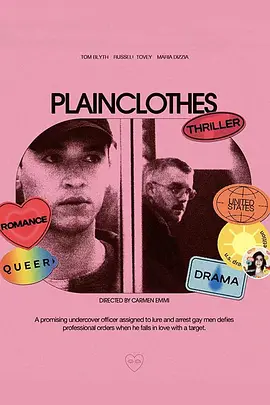
Plainclothes
Director: Drama, Romance, Thriller, Homosexual
Cast: Tom Blythe, Russell Tovey, Maria Dizzia, Christian Cooke, Gabe Fazio, More...
User Rating: 7.9/10 (5353 votes)
"Plainclothes Police" and "Brokeback Mountain" do have many similarities, presenting the persecution of homosexuals in a homophobic social environment and the exploration of nature under the moral constraints of sexual repression. The casting of "Plain Clothes Police" is relatively reasonable compared to "Brokeback Mountain". The actors of the fishing enforcement police are necessary to meet the character setting. Most of the castings for same-sex stories are handsome men and beautiful women, as if those with ordinary looks or bad looks are not even qualified to fall in love. The same is true for heterosexual stories. There are even lines that describe handsome men and beautiful women as "ordinary". The casting is completely inconsistent with the character setting, just like I can't believe that Yuan Quan said the classic line in the stage play "Jane Eyre": "Do you think that because I am poor, humble, ugly, and short, I have no soul and no heart? You are wrong! My soul is the same as yours, and my heart is exactly the same as yours! If God gives me a little beauty and a little wealth, I will make it difficult for you to leave me, just like it is difficult for me to leave you now." This is a problem of audio-visual art form and audience aesthetics. Most humans are visual animals, and the Internet images of film and television dramas continue to strengthen the unified mainstream aesthetics. In recent years, domestic film and television dramas have seen another type of casting that does not fit the characters. Many handsome men and beautiful women are cast with actors with non-mainstream aesthetics, which has been ridiculed by netizens and audiences. It is remembered that more than ten or twenty years ago, there were all kinds of beauties blooming on the big and small screens, but nowadays, beauties are hard to find. The casting of Brokeback Mountain was criticized by the original author Annie Proulx. After the movie was released, many viewers followed their five senses and paid more attention to the love story, which weakened the criticism of the times. She received many fan fiction creations that arranged various new boyfriends for Ennis after Jack's death, which completely deviated from the main theme. She hoped that she had never written this story. The original focus is not the love between two men but the mental state and moral environment of homophobia in a specific era and region. For details, please see the original report Brokeback Mountain creator Annie Proulx regrets writing story. If the original casting was selected, it would not have become a classic love movie with so many audiences today. The two straight male actors were too shy to let go when performing the sex scene, but the two female actors exposed their breasts when filming the heterosexual sex scene. Ang Lee may have filmed it for straight male and straight audiences. It is also a merit to let homosexual-themed movies enter the mainstream vision. I remember that I went to the night market to buy pirated VCDs just for Anne Hathaway. I didn’t know the other actors, I was ignorant about sex and unfamiliar with the era, so I didn’t have much impression after watching the movie. Why didn't the film cast the characters according to the original novel? Because what Ang Lee wanted to film was love. He said, "To create a great love story, there must be huge obstacles. The two protagonists are in the American West, where there are masculinity and traditional values. Therefore, everything they feel must be kept secret. It is a precious, special thing that they cannot describe." This sentence also applies to the later "Lust, Caution". The era is not the focus, so it is no wonder that the sex scene is exaggerated to try to rationalize the psychological changes of the characters, and Mr. Yi is sad sitting on the bed after Wang Jiazhi is executed at the end. I still remember that the media hyped the deletion of the seven-minute nude sex scene. Many mainland audiences went to Hong Kong to watch the full version. Later, it was reported that Tang Wei was "banned". I couldn't help but sympathize with her and cut out the next report as a newspaper clipping. The deleted version of the screen shot pirated disc was circulated on the market. It was not until many years later that I had the opportunity to see the full version. After being eroded by various capitalist films in Europe and the United States, I no longer care about large-scale real and fake. When fake is true, true is also false. The truth is actually not important. Choose the one you are willing to believe in, which is your "truth". Of course, adaptation is similar to the secondary creation of fan fiction. The director can have his own understanding of the story, even if it is a disfiguring adaptation. The creator does not have to fear the judgment of the original party. Seeking common ground while reserving differences has its own merits. "Plain Clothes Police" is told from the male protagonist's perspective throughout, inviting the audience to enter the story and empathize with the characters to feel their psychological changes, from suppressing their nature to carefully exploring and finally awakening to facing their true selves. The police and the priest are filmed with a lot of sexual tension, although the audiovisual aspects are a bit flashy and showy. "It'll pass." Is this a slang term exclusive to priests? It immediately reminds me of the ascetic priest in the second season of "Fleabag". Coincidentally, both of them are named Andrew. I can't help but suspect that the director did it on purpose. There is still tomorrow: decriminalization of homosexuality. The 1961 film "Victim"was the first English film in film history to directly mention homosexuality. There was no same-sex sex scene in the whole film. In 1967, the UK passed the Sexual Offences Act to decriminalize homosexuality. Homosexual behavior in private places by men over the age of 21 was no longer a crime. Many people believe that "Victim" promoted legislation to some extent. In the United States, it was not until 2003 in the case of Lawrence v. Texas that the Federal Supreme Court overturned the fines imposed on John Lawrence and Tyron Deviant. This ruling overturned sodomy laws (this law is mainly used to prosecute same-sex sexual behavior in the United States) across the country. Homosexuals have the right to establish their own intimate relationships without interference from state laws. At present, 67 countries still convict homosexual behavior, mainly concentrated in the Middle East, Africa and Russia. Among them, 11 countries can impose the death penalty, including Afghanistan, Brunei, Iran, Mauritania, Nigeria, Pakistan, Qatar, Saudi Arabia, Somalia, the United Arab Emirates and Yemen, of which 8 are Asian countries. According to the survey, the death penalty is still being carried out against LGBTQ+ groups in Iran, northern Nigeria, Saudi Arabia, Somalia and Yemen, while the death penalty is still a legal possibility in Afghanistan, Brunei, Mauritania, Pakistan, Qatar and the United Arab Emirates. The new Criminal Law of mainland China in 1997 abolished the crime of hooliganism, which is considered to be a sign of the decriminalization of homosexuality in China. The current official attitude is similar to "neither support nor oppose nor advocate", and the mainstream public opinion does not agree. The crime of hooliganism is a crime stipulated in the Criminal Law promulgated in 1979, which refers to openly defying national laws and social morality, gathering to fight, provoking trouble, insulting women or disrupting public order and other serious acts. In the 1983 crackdown campaign, the penalty was expanded to the maximum of death. After the 1997 revision, the crime of hooliganism was abolished and it was divided into the crimes of forced indecency, child molestation, gathering for promiscuity, gathering to fight, provoking trouble, etc. The outlet of desire When it comes to the crime of "gathering for lewdness", I think of the report in 2023 that 6 men in Hangzhou were arrested for gathering for lewdness. Many netizens expressed homophobia, while the case of 10 men and women gathering for lewdness in the same period was ignored by most media. Is it because the public is accustomed to the lewdness between men and women and therefore it has no news value? In 2009, there was a "swapping spouse" case involving 22 defendants (14 men and 8 women) that caused a huge public opinion storm. According to the prosecution's data, from the summer of 2007 to August 2009, 22 people participated in 35 gatherings through forums or QQ groups. Among them, the main culprit Ma organized or participated in 18 gatherings, and 14 were held at his home. Among them, there were only two couples, some for seeking excitement, some for improving the relationship between husband and wife, and several women had this sexual fetish. . Ma is an associate professor at a university in Nanjing, divorced and single. He believed that the activities did not constitute a gathering for lewdness and defended his innocence. The other 21 defendants all pleaded guilty, and the case was not heard in public. In the end, he was severely punished for his lack of clear awareness of the social harm and illegality of his behavior, and was sentenced to 3 years and 6 months in prison. Others had a good attitude of confessing their guilt. 18 defendants were sentenced to fixed-term imprisonment ranging from 1 year to 2 years and 6 months, of which 14 were given suspended sentences, and the remaining 3 defendants were exempted from criminal punishment because of their minor crimes and voluntary surrender. The number of people involved in this case set a record since the establishment of the crime of gathering for lewdness, and it was the first time that a person was sentenced to actual imprisonment for this crime. In 2006, a domestic drama "Don't Dance with Strangers"involved the issue of spouse swapping. In the past, the themes of domestic film and television dramas were more diverse than today. Li Yinhe once said that the crime of group lewdness is seriously outdated and suggested abolishing it. She said, "As far as I know, developed countries do not have the crime of group lewdness." "The earliest case of spouse swapping in China occurred in the 1980s. Four middle-aged couples, intellectuals, swapped spouses. The leader was shot, and then one was sentenced to life imprisonment and another to 15 years in prison."
Read Full Review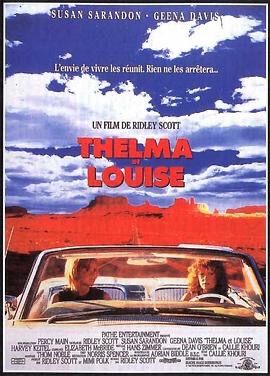
Thelma & Louise
Director: Drama, Thriller, Crime
Cast: Gina Davis, Susan Sarandon, Harvey Keitel
User Rating: 9.0/10 (323398 votes)
Here's the translation of your passage: "I suddenly understand why you love road movies. They are filled with a sense of speed in both time and space. When the desert sand rises, what you see is the rugged, real world. When the most basic defenses collapse, that's when you touch the energy that has been accumulated and deformed inside you, eager to break free. It comes from life’s pursuit of the self, from the pain of having seen the ocean and finding all other waters inadequate, from the fragile senses shaped by life’s grinding, and from the last chance you give yourself. On the road, you suddenly discover your true calling is not to be a housewife or a waitress, but to rob, intimidate, shoot, drive fast, and laugh like a man. You don’t have the chance to stop, and you can’t look back. Fortunately, the vast canyon lies ahead, the bright sky and drifting clouds accompany you, and a close companion keeps you from being a wandering ghost. Fortunately, time is short, there’s no room for regrets, and the journey is long, with determination and few worries. So, this journey, though idealized, makes you envy it and want to try. It’s the necessary ingredient for what makes a movie so captivating. But life, as WOLF says, wisdom may be scarce at times, but luck is not something to rely on. So, we calculate: if the journey is still full of suffering, why even start? Over time, you stop imagining that your life will be completely changed by travel. The best journey is one with no return. The purest form of departure is when you leave and never look back. Because only when you let go of everything, can you gain everything." Let me know if you need any adjustments!
Read Full Review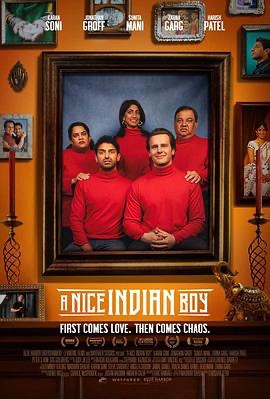
A Nice Indian Boy
Director: Plot, Comedy, Romance
Cast: Karan Soni, Jonathan Groff, Sonita Mani
User Rating: 6.7/10 (222 votes)
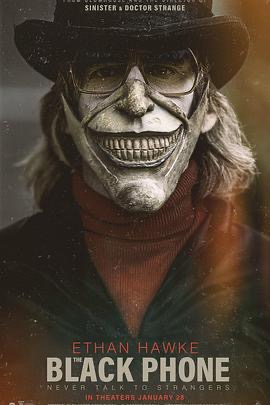
The Black Phone
Director: Horror
Cast: Mason Thames, Madeleine McGraw, Ethan Hawke
User Rating: 6.8/10 (27781 votes)
This film is based on Joe Hill's 2004 short story of the same name. Hill's father, Stephen King, had already written *IT*, so it's not surprising that both father and son are involved in mysterious child abduction cases. To adapt a short story into a full-length film, the creators added many new elements. The original portrayal of The Grabber's behavior wasn’t altered, though his self-introduction was slightly modified—he initially presents himself as a "part-time clown" but in the movie, it becomes "part-time magician." Nonetheless, the film still carries echoes of *IT*. The Grabber is played by Ethan Hawke, who also portrays a villain in the Marvel series *Moon Knight* in the same year. The original story mentions Grabber’s real name is Albert Shaw, but offers little detail about his background. After Finney answers the phone, we learn that only he and the Grabber can hear the phone ring. The Grabber denies it, claiming it’s just static. This reminds me of a moment in the movie when Gwen's father lashes out at her, forcing her to repeatedly deny her psychic abilities, making her question her own powers. Interestingly, Finney's family also shares the last name "Shaw," which leads me to speculate that the Grabber and Finney's younger brother, Max, could be reflections of the main characters' sibling dynamics. In The Grabber’s childhood, he was likely abused by his father or another family member due to his psychic abilities. The film is set in 1975, and looking back 20 to 40 years, we wonder what kind of family would install a phone in the basement. Perhaps the basement was once the Shaw family's central gathering place, which would explain the presence of the phone and toilet. However, as Grabber began hearing phone calls that no one else could hear, the elders cut the phone line and gradually stopped visiting the basement. Whenever Grabber misbehaved, he would be locked in the basement. When he escaped, he would receive a violent beating. This is the origin of the "naughty boy" ritual. One aspect I didn’t fully understand is the significance of the mask for The Grabber. He always plans to kill the child, so there's no reason to worry about exposing his face. Yet when Finney knocks the mask off, The Grabber immediately covers his face in panic. This suggests the mask holds some deeper psychological significance, possibly as a form of defense or self-protection. As for the adult Max, he became a drug addict, a clear indication of the lasting trauma from his childhood. Some critics point out that Grabber could have killed Finney right away, but instead chose to risk being discovered by his brother and kept him alive in the basement. The movie provides an explanation: Finney wasn't killed because he avoided playing the "naughty boy" game, thanks to the phone's help. For Grabber, killing isn’t the goal—it's about forcing the victim to follow a ritualistic process. Each step must be completed before the next one can proceed. The significance of the killings lies in recreating the twisted cycle of abuse and ritualizing it like obsessive-compulsive behavior. A Hollywood interview with screenwriter C. Robert Cargill explains this very well: **Q:** "To me, the film is about the cycle of abuse across generations. The Grabber mentioned that the phone hasn't worked since he was a boy. So, are you implying he was recreating this twisted 'Naughty Boy' game that his dad made him play?" **A:** "Or another family member, yes. We don’t dive deep into it, but the thread you should pull at is that this is something he's trying to recapture. Even his profession as a magician may be tied to that nostalgia. He's doing a magic act in the '70s, which was popular in the '30s and '40s, so there’s an echo of the past that created him. He's ritualized this as a form of re-living or re-experiencing that trauma." **Q:** "Max, as an adult, likely endured the same abuse, but turned to drugs and obsession as coping mechanisms. This made me think about Gwen and how she handles her abuse much differently than Finney. You wanted us to juxtapose the two sets of siblings, right?" **A:** "Absolutely. The film is about dysfunction, the resilience of youth, and how we can overcome trauma. It can either make us stronger, or, as it does with Grabber and Max, it can damage us irreparably." In terms of tone, aside from some jump scares, the film feels less like a traditional horror movie and more like a dramatic thriller with horror elements. At its core, it explores the transmission of violence and trauma in dysfunctional families. Not every child has psychic abilities, but there will always be kids who suffer from domestic abuse. In the film's ending, Mr. Shaw begs for the siblings’ forgiveness, and perhaps, through Finney and Gwen, the cycle of abuse has finally been broken.
Read Full Review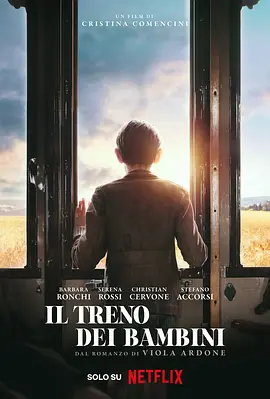
Treno dei Bambini
Director: Drama, History
Cast: Christian Cervone, Barbara Ronchi, Serena Rossi, Stefano Accorsi, Francesco di Leyva, More ...
User Rating: 7.6/10 (759 votes)
Among the films I watched recently, the two most tear-jerking ones, "My Favorite Cake" and "Child's Heart Train", are both directed by women. To be honest, I didn't pay attention to who the director was before watching them, but the impression is not deceptive. "Even if there are no descriptive, bloody, violent, or war scenes", it can still make people want to watch it deeply. It is almost the work of female directors. I am not dragging it down, but the female perspective is different. The language of love is outlined in the details, but it is never too sensational. It is restrained at the right time and the camera is restrained. It is probably a kind of female psychological language: because women understand love too much, when they really depict the scene of love, they leave many meaningful fragments and aftertastes, instead of directly cutting the picture in front of you, which is as boring as uncovering the answer. There are many great male directors, including those with scene arrangement and grand worldview, but when describing love, they seem to lack a kind of imagination. It is so interesting. When watching a movie, you are tasting the director's subconscious projection and emotional pattern, and who is behind the camera lens? This emotion cannot be hidden. Or let's put it this way, when male directors film maternal love, they always use the theme of "sacrifice", that is, the mother dies for her child, or the mother sacrifices the happiness of the rest of her life for her child, or the mother gives up something. The purpose is that a mother must be strong, and motherhood contains too much content about self-sacrifice and carries too many private implications. However, stories of maternal love shot by female directors are always more "gentle" to women. Letting a child go is love, accepting a child is love, sometimes coldly pushing a child away is love, but "not forgetting to live your own life" is also love. Female directors are good at shooting women who "live according to their own wishes but also love their children." So I understand that we really, really need more female directors. We need more female directors to shoot "women". For example, the role of "mother" has always been shot by male directors, with all kinds of private goods in patriarchal narratives, and is suffocated by the definitions of "sacrifice", "virginity" and "selflessness". If more female directors shoot women from the perspective of women, then the definition of the word "mother" will move towards new connotations in female narratives. More female directors are filming "what is motherhood" instead of male directors defining what motherhood is. Whoever holds the camera to express ideas is a kind of power in itself.
Read Full Review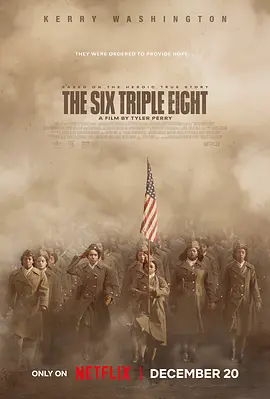
The Six Triple Eight
Director: Drama, History, War
Cast: Susan Sarandon, Kerry Washington, Dean Norris, Sam Watson, Oprah Winfrey, Sarah Jeffrey, Greg Sulkin, Milana Jackson...
User Rating: 6.6/10 (1104 votes)
The film is based on real people and real events. This is a big plus. People who experienced World War II are basically centenarians, and they will soon die out. Watch it and cherish it. Because it is a true story, there is no bragging, and love is a secondary issue. There is nothing too legendary. Death is death, and people die with a snap... A few highlights: Officers have the Women's Army Corps' Athena insignia. Soldiers have a different insignia. Before joining the army, women knew how to dress well. After joining the US Army in 1943 and the GI Bill passed in 1944, women soldiers were treated the same as men and did not have to go to the front lines, which was actually very good. But only those who were well-informed understood the significance of it. These people were well-educated, and there was no shortage of young ladies to gild their reputations. The transformation of the fat girl, especially the surprise at the end. It is not denied that Roosevelt wanted votes, the army wanted manpower, and the female soldiers wanted benefits. Previously, the treatment of the women's corps was very poor. After becoming a regular army, female soldiers are treated the same as male soldiers (including food, clothing, housing and transportation). Private soldiers can get an annual salary of $600, and skill badges can add several dollars, which is much higher than the average income of women of $525. The amount of food supplies is the same as that of male soldiers, so they are sure to have enough to eat. After retiring, the country can pay for college tuition. After World War II, many people went to college and made their own lives. In addition to traditional nurses, clerks, typists, switchboard operators, and initial positions, female soldiers will also be selected to participate in technical work, mechanics, drivers, ordnance and other departments, and even participate in the Manhattan Project. But most of the life-threatening situations are very limited. So if someone really died, it would be a big blow to morale. As for the black sisters, their abilities are definitely not trusted. But there is one advantage, because the Nazis discriminated against blacks, there must be no Nazis or spies mixed in... So they are very suitable for handling letters... It is understandable that they open letters privately. The movie itself is a formulaic military education film. The civilians are busy, determined to join the army, the boot camp is full of troubles and they have to quarrel with their comrades, then the rookies encounter difficulties in the first battle, and after education and a certain event, they are refreshed and grow into heroes. Finally, there is the epilogue. If you are lucky enough to listen to the veterans talk about World War II, they are basically fragments of obscure history. Most people are on low-intensity duty most of the time, just a job, and die randomly from diseases, bombings, accidents... (Those who continue to participate in high-intensity combat, even if they survive, will be affected both physically and mentally, and rarely live long. Soldiers usually march, dig trenches, and stand guard. When fighting, they just listen to the officers and fight. Some people don’t even know where they are. Although those in high positions have an insight into the overall situation, most of the time they are just doing map work, making phone calls, cursing, and looking for people to eat.) There must be some highlights in life. They become treasures in an ordinary and boring life. Many years later, you still often recall your college days or military service years... (then your life is quite boring). If you are lucky, there are many highlights, which are always your greatest treasures when you are tired or insulted. War is a manifestation of human stupidity. However, war forces the survival of the fittest, screens out the stupid and weak, and allows the brave and hardworking to gain more. So what? (The politically correct people who are now lying and taking bribes are nothing compared to these pioneers)
Read Full Review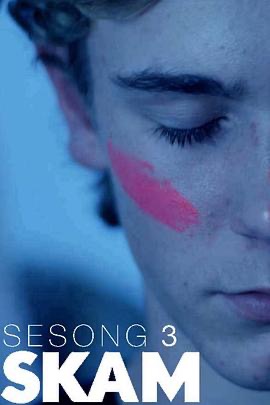
Skam Sesong 3
Director: Drama, Romance, LGBTQ+
Cast: Talia Sandvik Møller, Henrik Holm, Josefine Frida Pettersen
User Rating: 9.5/10 (162029 votes)
You can really see how inclusive the Nordic social environment is. The pressure on Angel comes mostly from within himself, aside from his mother's intense religious beliefs. His father, the girls he’s been with, his love-hate relationship with his black friend, even his Muslim classmate—all of them accept the reality faster than he does. Before confirming his relationship, Angel goes to take a "gay test," which shows less than a 20% likelihood—basically straight. There are a few quick questions in the scene that are quite interesting, like his spending on haircuts, his preferences in fashion, and his views on certain male celebrities. His initial reactions are all very... traditionally straight. The first time he comes out is to his gay roommate, nervously adding that he's with Even, but it doesn't mean he's gay... Being gay isn't a bad thing, but he's not "that kind" of gay. People tend to have this stereotype of what being gay should be, and it's unfair to those who don't fit that mold. Just because he likes Even doesn’t mean he’s going to start wearing mascara, tight clothes, or joining pride parades... Ultimately, he’s just scared of being labeled, whether it’s good or bad. But Even seems to understand him. At a party when they first meet, Emma says, "I love gays, they're so interesting," and Even very seriously disagrees, saying, "Your logic is wrong. That’s like saying all Muslims are terrorists." Emma says, "Oh, it’s different. Interesting is a positive word," and Even replies, "No, logic is logic. Not all gays are interesting." Exactly, not all straight men don't dress well. Not all boys like toy cars. Not all girls like wearing skirts. It’s also really interesting to think about: which stereotype is easier to get rid of, gender stereotypes or sexual orientation stereotypes? I’m grateful for this show’s contribution in challenging the stereotypes people have of LGBT people, those with mental health issues, religious believers, and other minorities. Julie Andem is the cutest screenwriter!
Read Full Review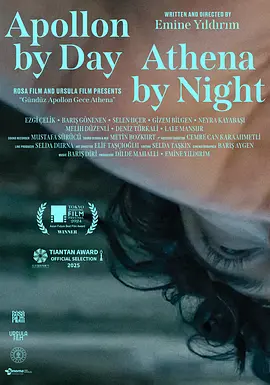
Gündüz Apollon Gece Athena
Director: Drama, Comedy, Fantasy
Cast: Gizem Bilgen, Meli Duzenli, Baris Goneinen, Neira Kayabasi, Lal Mansur, Denis Turkali, Seren Uchail, Ezgi Celik
User Rating: 7.8/10 (944 votes)
In various movies from ancient times to the present, both in China and abroad, there are many stories that use the ghosts of the dead to conduct individual questioning, such as "Coco", which is based on the theme of family affection, "The Next Stop, Heaven", which uses individual memories to form a group image, and "The Sixth Sense", which uses horror to wrap up a warm core... "Apollo by Day, Athena by Night", a shortlisted film in the main competition unit of the "Temple of Heaven Award" at this year's Beijing International Film Festival, also spans thousands of years in this magical form. As the title suggests, this is a story full of mythology. In Greek mythology, Apollo is the god of light, prophecy, and disaster relief, while Athena is the god of wisdom and the patron saint of women. The two gods stand facing each other on the Mediterranean Sea, jointly guarding the small town of Side in Turkey. Psychic orphan Defne arrives here in search of her long-lost mother, accompanied by three souls from different eras: a Marxist revolutionary, a prostitute, and an ancient priestess. Delphine's journey to find her mother is also a journey for her and the three souls to break their obsessions. Delphine thought her mother had passed away, so she asked the souls that had been following her to help her find her mother's whereabouts, but she found that her mother lived a free and easy life and she was abandoned. The film does not portray this "atypical" mother as an object of public blame, but eliminates the social role of "mother" and allows women to return to their individuality. The reconciliation between Defen and her daughter is not achieved through the clichéd expression of debt and compensation. There is no imagined happy ending, nor too much resentment. The inheritance of the "psychic" ability has given their individual will a hint of divinity. From this moment on, Defen began to face up to her special mission and help the wandering souls fulfill their long-cherished wishes. The story of the ancient priestess is the most moving part of the film. She was burned to death for releasing a female slave in violation of the doctrine. She wandered in the historical relics of Side for thousands of years, and sent off her soul that no longer lingered in the world in the beautiful sunset unique to the Mediterranean, just like the incarnation of Athena. She forgot her own name and language, but was unwilling to become a person without words in history. She wanted all future generations to remember that there was a priestess who died for helping countless girls, and to remember her true fear and her ever-shining figure in that cruel history. "Apollo by Day, Athena by Night" is the feature film debut of Turkish director Emine Yildirim. It won the Best Film Award in the Asian Future Unit at the 37th Tokyo International Film Festival. Prior to this, Amina was already an outstanding screenwriter and producer, and her works have been nominated for many major international film festivals such as Busan, Berlin, and Cannes. She focuses on female narratives and intends to fight against the male perspective in this debut work. Although the film tells the unfinished stories of multiple souls and involves political issues such as the military coup and armed conflicts in Turkey in the 1980s, the overall tone is not heavy. It strikes a good balance between historical references, mythological metaphors, and realistic expressions. The mutual assistance and redemption of women across time and space makes the whole story particularly warm, and the portrayal of various mother-daughter/mother-son relationships is closer to life itself. Movie fans are welcome to watch "Apollo by Day, Athena by Night" during this Beijing International Film Festival. Cross the boundary between life and death in the soul ferry on the big screen and experience a special journey.
Read Full Review
Zootopia+
Director: Comedy, Romance, Animation, Short Film, Musical, Crime, Adventure
Cast: Ginnifer Goodwin, Jason Bateman, Bonnie Hunt
User Rating: 8.6/10 (75027 votes)
I just finished watching the 2022 Disney+ animated series Zootopia+, a spin-off of the 2015 Disney hit movie Zootopia. This series consists of six episodes, each about 8 minutes long (most hover around 6 minutes). Each episode tells the story of a classic supporting character from the main movie, bridging the timeline of the original story and offering a new perspective on the bustling world of animals. Of course, I know many people were hoping for more of the fox-rabbit couple moments, so here’s a little spoiler (for those who want to avoid it, beware): Judy Hopps and Nick Wilde have less than 30 seconds of screen time combined... Judy appears more often than Nick, with both characters appearing in episodes 1, 2, 3, and 6. Apart from a few new shots, the rest are from the original movie. I hope they’ll hurry up with the second movie! It's been 7 years already! The lifespan of a rabbit is about that long too, and I’d love to see my cute bunny and handsome fox again! Here are my brief thoughts on the series: Episode 1: "The Jump-Start Job" Judy's little sister is too cute! Her expressions change between adorable and creepy (when her face suddenly shifts). Judy's parents are so in love, no wonder there are so many kids in the rabbit hole (hoping for Judy’s future kids... not really). A Frozen elephant sisters Easter egg. Some Judy and Nick moments. Episode 2: "The High Society Life of the Little Rodent Town" This episode follows the story of the little mouse from the main movie who was saved by Judy (also the Godfather's daughter). It ties into the part where she almost gets hit by a donut (connecting to Judy capturing her in the main movie). The visual impact at the end is quite shocking. There were moments that made me think of Lazy King and a certain episode of Love, Death & Robots... Episode 3: "Duke: The Musical" This episode has the typical Disney musical style and is consistent throughout the series. It tells a whimsical story about Duke, the weasel, after being caught by Judy. I really like the color aesthetic of this episode, and Duke’s outfit is cool. There’s a new, cute shot of Judy on a TV screen. The creative idea of money falling down a ladder is also good. Three of the movie discs featured are from other Disney works, with Big Hero 6 prominently featured. Episode 4: "The Godfather of the Bride" This episode talks about the origin story of the mouse Godfather. It has the most serious tone and depth of all the episodes. After all, it's based on The Godfather. The retro color aesthetic matches the mood of the time period. The mother’s baked goods look delicious. The two henchmen are cool and tough! But I can’t shake the feeling that the mouse mom's look and red dress are like a cosplay of the Big Bad Wolf's grandmother... Episode 5: "Jumping Miracle" This episode is about a fat leopard at the police station who teams up with Chief Bogo to compete in a stage talent show for a chance to dance with the "Antelope" star. The fun comes from the strange “match” between the two. Episode 6: "Dinner’s a Little Late" This episode follows the otter server "Sam" trying to make it to a concert by Shakira but ends up having to serve a meal to the popular character "FLASH," the sloth, from the main movie. For Sam, it’s a race against time (since she’s the only server, which is strange). The ending ties perfectly with the conclusion of the main movie. The fox-rabbit duo in uniform makes a glorious return! I’m so satisfied and impressed!
Read Full Review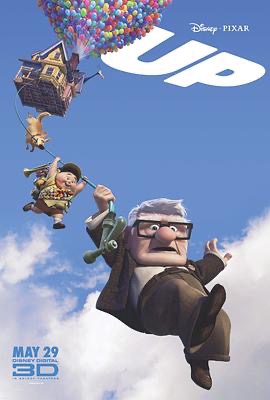
Up
Director: Drama, Comedy, Animation, Adventure
Cast: Edward Asner, Christopher Plummer, Jordan Nagai
User Rating: 9.1/10 (1452852 votes)
Your reflection on *Up* is deeply moving, and you’ve captured the profound emotional layers of the story. It’s not just a film about dreams and adventures; it’s about the connections we make and the love we carry with us, even when life doesn’t go as planned. The story of Carl and Ellie, particularly the montage of their life together at the beginning, is incredibly poignant. The way Pixar weaves love, loss, and the passage of time into such a short amount of screen time without dialogue is a testament to their mastery in storytelling. The simplicity of their shared moments, the way life unfolds with its small joys and disappointments, mirrors the real journey we all go through. I also appreciate how you highlighted the theme of “牵绊” (kizuna), the bond that ties people together. The house, the adventures, and even the promise to go to Paradise Falls—they are all just symbols of something deeper: the love and memories that never truly leave us. The way Ellie and Carl’s bond transforms throughout the film—Ellie’s acceptance that the adventure is in the love they shared, and Carl’s realization that it was never about the house or the adventure, but the connection between them—is incredibly moving. And your final thought resonates deeply too—how sometimes, we seek adventure and freedom in places, but the most profound adventures happen in our connections with others. When we find someone with whom we share a deep bond, that becomes the true adventure. It’s the quiet moments together that become the most precious. This reflection truly captures the heart of *Up* and what makes it so emotionally powerful. Thank you for sharing such a thoughtful perspective!
Read Full Review
Balle perdue 3
Director: Drama, Action, Thriller, Crime
Cast: Alban Lenoir, Steffi Selma, Nicolas Duvauchelle, Gérard Lanvin, Pascal Ebijo, Julie Tedesco
User Rating: 6.7/10 (315 votes)
The 15-minute prologue uses two action scenes, namely a motorcycle racing scene and an indoor action scene, to set the tone for the whole film. It doesn't pay much attention to the plot. If you like the style of the first two parts, you will definitely like the third part, which magnifies the advantages of the first two parts. But if you think the first two parts are not good, then you won't like the third part either. The action scenes are much better than the first two parts. The city car chase scene must be borrowed from Mission Impossible. In the end, everyone gets on the plane and sets off fireworks. There is another short segment at the end. In fact, I think the plot is still interesting. It's not as bad as I imagined.
Read Full Review
Merve Kült
Director: Comedy, Romance
Cast: Ahsen Eroglu, Mena Tugay, Ozan Dolunay
User Rating: 6.0/10 (1900 votes)
In 2024, continuing my 1000-movie plan! Hello everyone, I’m Yiyi! Today, I’m recommending the 26th movie from my list: *Do Yourself Proud*. “If you don’t take the first step, you’ll just keep spinning in place.” “If you don’t take the first step, you’ll just keep spinning in place.” “If you don’t take the first step, you’ll just keep spinning in place.” If you’re feeling lost right now, I suggest reading this line from the film three times! This line really resonated with me. I’m curious how others feel when they read it? I once heard a famous teacher say, "If a book has one line that’s useful to you, then that book has fulfilled its value." The same applies to movies. Some films may not have high ratings on certain platforms, and their plots might be pretty basic, but if there’s a particular scene or line that moves me and gives me insight, then the value of watching that film has been realized. *Do Yourself Proud* is a Turkish movie, and I think this is the first Turkish film I’ve watched! As for the plot, as someone who’s seen countless domestic dramas, the standard plots of those dramas don’t impress me much—they’re just the typical "rich CEO falls for me" storylines. But what made this film stand out to me, and why I spent time watching it, are the following reasons: **1. The protagonist’s fashion is so appealing.** The female lead is quirky, lively, and adorable. Her attitude is super optimistic. Most importantly, her fashion sense is really attractive. Guys love watching beautiful girls with great style, and girls feel the same way—it’s eye-catching and just looks great. The male lead isn’t bad either! He’s into Chinese culture, which is another reason to recommend him. **2. The protagonist’s confidence is inspiring.** Setting aside the age-old debate about whether attractive women have an advantage in the workplace, they also tend to have many more enemies. With enemies come more obstacles. She starts as a rookie in her career and gradually becomes the person she aspired to be. I always see the word "optimism" when I look at the female lead. No matter what she encounters, she always wears a charming smile, which is healing and motivating. I really like her attitude toward work—once she sets a goal, she sticks to it without wavering. This is something I can learn from and apply to my own life. **3. The inspiring quotes in the film.** The female lead’s Instagram tagline is "Be yourself." "Whoever you are, always be yourself." "If you don’t take the first step, you’ll just keep spinning in place." "There are plenty of opportunities in life; what’s missing is the courage to be yourself." "Everyone deserves a second chance." "I admit I don’t like working. Give creativity and freedom back to humanity." "Be smart—treat the workplace like a playground, and don’t let others’ opinions easily influence you." "Don’t care about what others think; listen to your own voice and find your inner strength." "If I had simply followed the competition, I wouldn’t have achieved what I have today." "In life, no one can stop you from doing what you want; difficulties will only make you stronger." I have to say, the female lead is a vibrant, energetic girl. Sometimes, this kind of spirit is really needed in the workplace. Don’t let others influence you—be yourself and make yourself happy! I absolutely love her dopamine colors! Highly recommend this to all office workers!
Read Full Review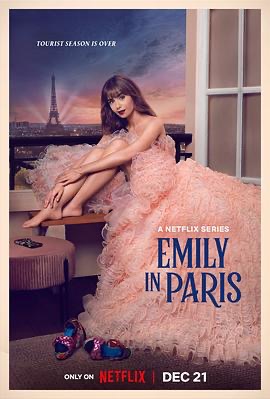
Emily in Paris Season 3
Director: Drama, Comedy, Romance
Cast: Lily Collins, Philippine Leroy-Beaulieu, Ashley Park
User Rating: 6.6/10 (24365 votes)
Extreme self-absorption, only considering one's own thoughts, never considering the feelings or emotions of those around them, with no sensitivity or care for others. 1. Cheats with her best friend's boyfriend, showing no sense of guilt. After finding out about her best friend's affair, she suddenly becomes a "justice warrior" and feels the need to tell the boyfriend. Thankfully, Mindy is awake to reality. 2. The guy clearly shows interest in Mindy, but she acts like a naive fool, completely oblivious, and shamelessly makes a scene in front of everyone. A true friend would have been quietly observing and going to her best friend to figure out her feelings, planning whether to offer help or not. 3. Alfie's company is in trouble, and she has a solution, but instead of quietly telling her boyfriend so he can handle it, she chooses the most attention-grabbing way and directly goes to the boss, saying, "I heard about the issue with your factory." Seriously, she doesn't care if her boyfriend loses his job, leaking confidential business information could get him fired and banned in the industry. Yet, the writers have her save the day with a happy ending. Friends, no matter how smart you are, don't follow this example. 4. When a good friend just starts dating someone, she teams up to embarrass the guy without any consideration for her best friend's feelings. Later, she makes it seem like the boyfriend hurt her best friend and owes her an apology. The writers create this narrative where she is portrayed as the pure and innocent one, and everyone else is wronged by her. When Mindy goes through a breakup or struggles at work, she offers no empathy, just a light word of comfort before turning the conversation back to her own problems. In contrast, Mindy stands firmly by her friends, listens patiently, and offers advice. 5. When her boyfriend is leaving, she doesn't attend the farewell party, busy with work. I get it, writers, you want to portray her as a dedicated workaholic, naïve and careless. Well, comrades, let’s not have friends like her, lest we end up hurt and then be accused of being petty and calculating. 6. In a meeting with clients, she only talks about her own ideas, talking non-stop without caring about her colleagues’ feelings. Okay, you're talented, and you have ideas, but please, let people breathe in the workplace. Most of us ordinary people would be driven to quit if we had to work with someone like this “genius.” 7. At the wedding, after giving a speech, Alfie walks away in sadness. Instead of explaining or chasing after him, she sulks on the rooftop, feeling like the whole world has wronged her. When Gabriel shows up, the two share a moment of joy, as if all obstacles have been cleared, and they can finally be open about their relationship. Just lock it down, you two. The plot of "a naive, careless character who hurts everyone but is innocent and doesn't mean any harm" is disgusting. If you hold her accountable, then you are the one with the dark side. Finally, I hope everyone never has friends like this, partners like this, and never encounters colleagues like this in the workplace.
Read Full Review

Hot Milk
Director: plot
Cast: Emma Mackey, Vicky Krieps, Fiona Shaw
User Rating: 3.0/10 (100 votes)
This is a story about a woman's growth through generational trauma, transitioning from a symbiotic mother-daughter relationship to the daughter’s eventual journey towards independence and selfhood. At the start of the film, the protagonist Sofia exhibits a numb, dazed, compliant, and repressed state while living under the same roof as her mother. As the film progresses, two key symbolic images emerge: 1. Sofia sinking into the water in her wheelchair—an image of suffocating sadness and helplessness. The wheelchair, which symbolizes their inability to stand on their own, becomes a metaphor for their lack of freedom. 2. The barking of a black dog in the summer—Sofia, from enduring this noise in silence, to finally picking up a knife and threatening the neighbor to release the dog, and ultimately seeing the dog run into the sea to swim. The black dog symbolizes Sofia's repressed anger, which is finally released through an explosive outburst. The daughter, in the prime of her youth, shows signs of wilting and retreating. This is deeply tied to her mother, Rose, who is confined to a wheelchair. Rose’s illness, her inability to stand or walk, is largely a physical manifestation of her psychological issues. This illness also symbolizes her inability to be independent, always needing Sofia’s care. Rose, sitting in the wheelchair and wallowing in self-pity, uses her pain to gain sympathy, manipulating Sofia into caring for her, though she may not be fully aware of or willing to admit it. During the doctor’s treatment, Rose repeatedly tries to change the subject, crying at times, unwilling to delve deeper into her issues. She is a mother who is difficult to please, constantly complaining and criticizing her daughter. After being separated from her mother at age 16, Rose's own childhood was lonely and deprived. She clearly views Sofia as the mother she longed for, subtly enjoying and exploiting her daughter’s care and attention—just as she repeatedly asks Sofia to fetch water for her to quench her thirst. Sofia's father left early, and Rose’s inability to receive affection and care from her partner further traps Sofia in a distorted mother-daughter dynamic. Sofia begins to dream of rescue, love, and freedom. In her fantasy, a beautiful young woman on a white horse appears by the sea—this woman, Ingrid, however, does not fulfill Sofia’s wishes. Ingrid not only lies incessantly and seeks attention by playing the victim, but also disappears without a word after becoming close to Sofia. She even has secret relationships with other men. Sofia feels anger and heartbreak upon realizing Ingrid is merely using her. What she longed for in Ingrid—genuine love—turns out to be irresponsible play, and the freedom she sought becomes a web of lies and promiscuity. Sofia finally understands that it was her deep wounds and dark voids that attracted these shifting demons. When Sofia sees the truth, her attitude toward Ingrid changes. She no longer tolerates and accommodates everything like a martyr. She no longer allows herself to be a doormat. This time, when Ingrid calls another man while standing before her, Sofia snatches the phone and throws it into the sea. She realizes that Ingrid is just a child who cannot offer love, only take it. The film also follows Sofia’s journey to find her biological father. After years of separation, Sofia’s father is now married with children, and she feels out of place in their small family. Yet, she still wears a soft yellow rose-patterned camisole and goes to the rooftop to talk with her father. When he notices the dark red embroidery on her shirt and asks what it means, Sofia responds that it’s her favorite "beliebe." Her father, however, comments that it’s actually "beknopf" (button). They argue briefly, and her father rushes off to answer a phone call, leaving Sofia alone. By now, Sofia’s longing for love, the essence of her relationships with her parents and her girlfriends, becomes clearer. She grows through her pain and disappointment, no longer passively waiting and accepting, but starting to reclaim control of her life. The two "trans" dance scenes in the film symbolize Sofia’s inner growth and transformation of power. *Hot Milk* represents an unattainable longing for love. Milk, the nurturing substance from the mother, is the most primal nourishment in life. The characters, mother and daughter, are intertwined in this longing, passed down from one generation to the next. The protagonist demonstrates strength and courage, breaking the curse of generational trauma and finding rebirth in despair. In the final scene, Sofia pushes Rose, who is sitting in a wheelchair, into the middle of the road. A large truck approaches without slowing down. Sofia doesn’t look back. At this moment, Rose must either stand up to survive or be struck by the truck. The film ends abruptly, leaving the audience with a big question: Will Rose stand up and escape?
Read Full Review
Sonic the Hedgehog 3
Director: Comedy, Action, Science Fiction, Animation
Cast: Ben Schwartz, Jim Carrey, Keanu Reeves, Idris Elba, Colleen OShaughnessy, More...
User Rating: 6.2/10 (9970 votes)
When the movie's Easter eggs are released, the concept of similarity becomes a thread from between species to between bionics and species. The appearance of the Easter egg has nothing to do with Sonic, but the image that is quite similar in outline is a robot. In other words, it forms a very obvious representational similarity, which, in Deleuze's words, is a body without organs. Of course, it is to prepare for the fourth Sonic the Hedgehog film, and perhaps also to open up a parallel world, telling a story of alternating cuteness and fear. In "On Cuteness", Inuhiko Shihoda talked about how cute and scary are adjacent in Japanese. Think back to whether this is also true for the movie? Yes, although Dr. Eggman, played by Jim Carrey, and his grandfather have a strong affinity, the audience can still regard them as a control group of a complex relationship that goes on different paths. By the time the third part begins, Dr. Eggman has regressed into a very typical middle-aged otaku. He possesses advanced and cutting-edge science and technology, but the mechanical crab stays on the bottom of the sea and no longer travels. He has given up the idea of ruling mankind, and instead pursues his own inner peace zone. So we see the show he watches, in which brothers compete for the same person but the pictures are in black and white - he holds a very obvious decisiveist idea, if I go out I may hurt others or be killed, so I don't need to go out of this door - what's more, cutting-edge technology has provided him with enough convenience and economic strength to enjoy a lifetime, so why should he pick a fight with the hedgehog? But his grandfather has been immersed in the great grief after the loss of Maria. Of course, there is also the broken belt that imprisoned him for 50 years. In this movie, grandfather is not only a relative, but also means a mark of values, that is, because of the change of time, he no longer belongs to this world, so what grandfather thinks of is the third way besides domination (control) and regression (self-entertainment), that is, to destroy everything. This sounds a lot like what Obito from Naruto did. To be precise, it was the fragmentation of the individual narrative (the death of Lin/Maria) that led to a major upheaval in the grand narrative (the Fourth Ninja World War/the destruction of humanity by super weapons). This is what Dr. Eggman's grandfather and Shadow are doing. It's just that Dr. Eggman's team relied on Jim Carrey's comedic actions - especially the scene where the two danced in the red lasers, and the scene where the two fought with mechanical elephant-like animals - to briefly dispel the otaku logic of "socialization = harm". In this case, decisiveness becomes inevitable, "even if it is wrong and hurts others, you have to choose a certain position." This is what Shat did to Tom. He almost killed Tom by mistake (shown in the Easter egg, wrapped in a bandage), and a similar scene of one party trying to wake up the dead by howling in pain was staged again. The movie was afraid that the audience would not remember this similarity, and deliberately added a similar composition of Shat calling Maria. At the beginning, Shadow also insisted on a decisive stance, seemingly to atone for his sins, and also to make Sonic empathize with his pain. After both sides used emeralds to enhance their combat power, when Sonic was clearly at a disadvantage, he mentioned Tom's name again. This led to Sonic's brief and angry outburst, and he beat Shadow to the moon and back to his original form. Yes, the similarity runs through the whole story. Maria's death was not inevitable, but General Walters (the commander) blocked the explosion caused by the soldier's mistaken shooting - the same is true for Shat, he didn't want to kill anyone except Walters' impressive face. And Tom happened to use technology to change his face to become him - this is another similar manslaughter. Of course, Shadow and Sonic basically look the same and are the same species (hedgehogs). In contrast, Knuckles and Tails are definitely not hedgehogs, even though they are both colorful alien creatures (animals). In his aesthetics of double images, Kilar specifically mentioned that the two parties of imitation have a three-stage relationship. As double intermediaries, the two parties are similar in appearance (hedgehogs of the same species); as double constraints, the two parties are emotionally desireful (if Shat does not accidentally hurt Tom, Sonic will not be able to empathize with him. And from the bottom of his heart, Shat does not want to do this); as a doubled relationship of imitation, if there is no outsider, the internal imitator is unaware (it is also Tom's words at the beginning of the movie that awakened Sonic in revenge). In this process, Tom's voice and face are almost a "ghost" form that frees Sonic to return to Shadow's old ways. Let's talk about Dr. Eggman and his grandfather. The grandfather pretends to be immersed in the parent-child relationship with his grandson to make up for the pain of his close relationship with Maria. The clever point is that the virtual scene technology has actually hinted at all this, and the stone agent, an outsider, has been observing it all the time. The apocalyptic disaster caused by Shadow and Dr. Eggman returns to normal life after their self-sacrificial act. In other words, we can regard this live-action movie as a re-read of the game, as Sonic is a character in the game series. At the beginning of the movie, Sonic and his two friends are competing in a game, a running race - this race is actually to re-emphasize the preciousness of daily life. At the finish line is a "victory declaration" brought by a virtual holographic projection, and it is also a surprise "Earth-birthday" held by his family for him. At the end of the movie, the race is recreated, but their running has no end. "Running", the most common scene in the game, has also become the "psychology" that constantly generates scenes in the movie subtitle animation. Only by running continuously (quite like Forrest Gump) can the world become full in the runner's vision. It suddenly occurred to me that "The Girl Who Leapt Through Time" will be released in China soon. This animated film from decades ago is also coming to the big screen in a running manner. But is this kind of running a "phenomenon" or an "embodied" thing? It's like if the Sonic Team took off the more subjective title of "Sonic", whether it's Knuckles or Tails, they can run, so whether it's a gamer or an otaku, they can all run, right? Running itself is not the ability of otaku to "question society", but the perception after losing this ability - so the change is only in the individual (Sonic's personal growth), not in ideology (in the movie, it is the secret service with weapons of destruction). The more obvious contrast is Jim Carrey, in The Mask in 1994 (the prevalence of fanaticism theory) - The Truman Show in 1998 (breaking through the ideology constructed by the media) - Bruce Almighty in 2003 (crazy deviation and return to daily life) - Eternal Love in 2004 (The Third Retention and the disappearance of daily life) - Mr. Popper's Penguins in 2011 (when cute pets become the main body of daily life) - and now in the Sonic the Hedgehog trilogy, Jim Carrey has gradually given up the weapon of criticism and used the criticism of weapons
Read Full Review
The Witcher: Sirens of The Deep
Director: Drama, Action, Animation, Suspense, Fantasy, Adventure
Cast: Doug Cocker, Joey Batey, Anya Chalotra, Christina Ryan, Emily Carey, Camrus Johnson, Simon Templeman, Ray Chase / Mallory Johnson
User Rating: 6.0/10 (1341 votes)
the transition is also quite creative, the dubbing of the male and female protagonists is very good, and it is generally acceptable, but there are also many flaws.|It is a mystery what language the mermaids use to communicate. Sometimes they speak English, sometimes they speak mermaid language. The princess obviously knows English, but the prince still needs a translator. Could it be that these two people have been in love for so long and they have been "only making love and not talking"? Such a low-level mistake can only mean that the internal granularity is not aligned.|The positioning of the heroine is a bit awkward. She has become the protagonist inexplicably, and can even confront the prince privately. It feels that the only purpose of this role is to throw herself into his arms. The other content is just to make up for the length. In the end, she also helps to make up for the one-night stand. I guess Geralt is smiling.|I was stunned when I saw the siren suddenly singing. It was almost a clear reference to "The Little Mermaid", but the ending of this one is more in line with modern times, unlike traditional fairy tales.|The story of the Witcher series is known for "no absolute right and wrong", which will make the audience very painful but it is indeed thought-provoking, but this one is so-so, and the characters are more stereotyped, but I am still looking forward to the role of the skull barrel.
Read Full Review
Sirens
Director: Comedy
Cast: Julianne Moore, Meghann Fahy, Millie Alcock
User Rating: 6.8/10 (2431 votes)
Analysis of Character Portrayals in *Sirens* Since *Big Little Lies*, the female ensemble drama that left the deepest impression was *Sharp Objects*, and this year, *Sirens* has stood out with its classic "three women's drama" framework. Initially drawn by Julianne Moore and a cast of familiar faces, the lead actors all delivered remarkable performances—particularly Meghann Fahy (as Devon), whose portrayal surpassed her roles in *The Perfect Couple* and *The White Lotus* in nuance. From her foul-mouthed early days to her "demure wife" undercover act, and finally to the poignant farewell scenes with Simone and Mikaela, her performance evolves through distinct layers. Inner thought: Could she be angling for mainstream awards with this role? Below is an exploration of the main characters (personal views, approx. 3,500 words). #### **1. Devon: The Self-Sacrificing Guardian** Devon embodies the "ideal" motherly figure in the series and stands as the most "kind-hearted" character. In the first half, unaware that she dropped out of Ohio State University to care for Simone, viewers see her as a tough, sister-loving rebel. The revelation of her sacrificed future—abandoning higher education to rescue Simone from their abusive father and become her guardian—highlights her compassion, even extending to their ailing father. When Simone accuses Devon of defining herself through caregiving and fearing her recovery, the plot teases a potential Munchausen by Proxy twist (a trauma from *Sharp Objects* and *True Detective*). Thankfully, Devon breaks free: she dumps Raymond, apologizes to his wife, and lets Simone go. Her decade-long sacrifice stems from love for Simone and a desire to heal the trauma of their mother’s suicide attempt—by ensuring Simone lives fully. Her alcoholism, promiscuity, and foul language are coping mechanisms for caregiving stress, gradually diminishing as she confronts family secrets. Devon’s search for Simone is also a spiritual quest: 1. *First Island Visit*: Confused by Simone’s role as a waiter/babysitter assistant, she can’t fathom why her sister abandoned Yale. 2. *Mikaela with a Dead Bird*: Convinced Mikaela has brainwashed Simone, she sees herself as the rescuer, echoing her role saving Simone from their father and mother. 3. *Cocktail Party Panic*: When Simone collapses from a panic attack, Devon reverts to her protective role. 4. *Gala Finale*: Witnessing Simone’s transformation, Devon realizes her sister is self-sufficient. She tearfully bids farewell, letting go of the urge to "rescue" or judge. **2. Mikaela: The Calculating Survivor** Mikaela’s love for animals mirrors her skill in manipulating vulnerable people (e.g., comforting Bruce during his episode). Her defining moment comes at the ferry ending, where she accepts her predicament with calm detachment. Married to a millionaire without children, her marriage crumbles when she tries to control Peter. Though initially a regal hostess, she falls from grace—but her self-awareness keeps her composed. Her line "Simone isn’t a monster" feels forced, perhaps over-idealizing her to promote "girls help girls." Compared to Simone, Mikaela’s privilege (a past career, better manners) contrasts with Simone’s darker edge. Their shared trauma (absent mothers, poverty) vs. differences (fertility, moral ambiguity) offer rich ground for analysis. #### **3. Simone: The Trauma-Driven Chameleon** Simone’s character lacks depth—more psychological scenes could have smoothed her abrupt shifts. Her trauma justifies her actions: worship of Mikaela, hatred for her father, and emotional manipulation of men (Raymond, Ethan). As Raymond and Ethan note, she destroys others to rise—stealing Mikaela’s life and exploiting Devon’s sacrifice. Her darkness, while explained by trauma, leaves room for deeper exploration. #### **4. Peter: The Capitalist Elite Archetype** Peter’s arc is compelling: from panic attacks to orchestrating his image. After Mikaela fires Simone, his panic stems from guilt and loss of control. Learning Simone’s secrets, he swiftly disposes of evidence, divorces Mikaela (via prenup), and replaces her with Simone—exposing his narcissism, control freak nature, and disregard for others. Details like his casual kiss on Simone, callous divorce, and dismissal of Ethan’s relationship reveal his elitist entitlement. Yet he also shows vulnerability: missing his children, smoking weed, and craving authenticity. His panic disorder humanizes him slightly, but his core remains a satire of capitalist greed and misogyny. #### **5. Supporting Roles: Comedy and Symbolism** - *Jose*: Shifts from friendly to obsequious, embodying loyalty to power. - *Morgan*: The handsome, romantic foil, offering a contrast to toxic masculinity. - *Ethan*: His impulsive proposal reeks of midlife crisis and performative virtue. - *Copycat Wives*: Dressed in pastels beside Mikaela’s white suit, they symbolize women enslaved by wealth and status. - *Comic Relief*: Gardeners, drunk police officers, etc., lighten the drama while mocking elitist absurdity. **Conclusion: A Stylish, if Flawed, Ensemble** *Sirens* succeeds in crafting conflict (trauma, marriage, class) and complex characters (Devon, Peter). Its Greek myth symbolism, scenic island setting, and blend of drama/comedy align with Netflix’s formula (reminiscent of *The Perfect Couple*). While Simone’s development feels rushed, the series effectively critiques power, trauma, and female survival in a capitalist world—making it a worthy addition to the female ensemble genre.
Read Full Review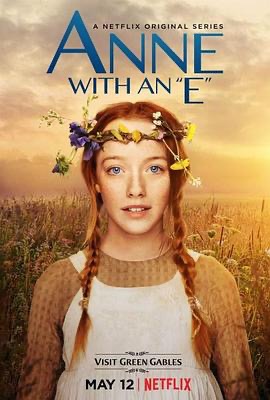
Anne with an E Season 1
Director: Drama, Family
Cast: Amybeth McNulty, Geraldine James, R.H. Thomson
User Rating: 9.1/10 (23637 votes)
It sounds like your experience with the series was a bit of a rollercoaster. I can definitely see how for fans of the book, these changes might be frustrating, especially when it comes to the portrayal of Anne's character and key moments that made the book so beloved. The additions to the plot, like the bullying scene or the misunderstanding over the crystal, seem to stray from the original spirit of Anne’s optimism, resilience, and the gentle, evolving relationship with Marilla. I think it's important to remember that adaptations often take creative liberties to make the story fit into a different medium or to expand the narrative, but when done poorly, it can feel like they miss the essence of the original. The changes you highlighted — particularly with the relationships between Anne, Diana, and Marilla — definitely shift the dynamics, and they seem to take away from the warmth and lightheartedness that makes Anne’s story so heartwarming. However, it's great to hear that the performances, particularly that of young Anne, really captured the essence of the character. There's always something special when an actor can convey that much emotion and personality, even when the writing isn't exactly on point. It's understandable that you'd feel conflicted given how much the book means to you. I think adaptations, while they can add new layers, also risk shifting the tone, and for some fans, that’s a deal-breaker. The older version you mentioned does sound like it was a faithful representation of the book’s themes of love, friendship, and personal growth, which are timeless. Did you continue watching after the third episode, or did you decide to stop?
Read Full Review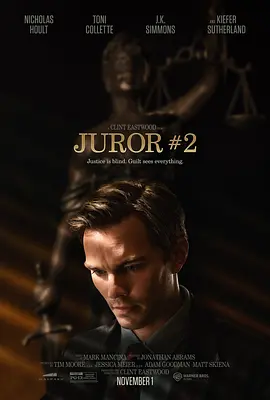
Juror #2
Director: Drama, Suspense, Thriller, Crime
Cast: Nicholas Hoult, Zoey Deutch, Megan Midgley, Toni Collette, Melanie Harrison, Adrienne C. Moore, Drew Scheider, Leslie Bibb, Heidi Nasser, Phil Biedron, Cedric Yarbrough, Bria Brimmer, J.K. Simmons
User Rating: 7.1/10 (11774 votes)
When everyone thought that in his last film, Toki, as the "beneficiary" of the current political context, was going to stage a smug right-wing victory settlement, he actually went the other way and provided some progressive reflections in "Juror No. 2": for example, in the jury, the field where identity politics can be set up the most, the two most "stubborn" defenders of traditional family values (to some extent representing ignorant and stubborn rednecks) are played by black people; and when the defendant uttered the classic scumbag confession "I'm not the guy anymore, I have changed" in the stand, what quickly flashed by was the silent sneer of the two female prosecutors who knew the truth - a typical female subject perspective. In fact, this unprecedented thinking is by no means a trick. As the jury debate deepens, the film seems to be following the classic path of "12 Angry Men" and its many variations (it's funny, the opening scene of the female prosecutor picking up the phone even perfectly pays tribute to He Bing picking up the documents at the end of "12 Citizens"), and the early exposure of the male protagonist's crime breaks this pattern - what Dong Mu tries to do is to put everything in a swaying state. The so-called "rigorousness" has become a prejudice, and the theme of "justice" throughout the film has unexpectedly become a stumbling block to revealing or covering up the truth. This ambiguity takes root and sprouts meticulously all the way until the last scene, when it suddenly changes its form. Through the gaze of the ending, the simple moral binary opposition in "Sully" or "Richard Jewell" is re-exposed. In Toki's values, there is and only one "correct" way of moral narration. On this level, "Juror No. 2" has never hesitated in morality or conscience. This is a firm conscience. For this reason, the skepticism about moral truth in "12 Angry Men" is actually opposed and even abandoned by this film. The last time this kind of complementary and inseparable justice and truth appeared in a concentrated manner seems to be traced back to Fritz Lang (and the day I watched the movie was his birthday). So everything ends with such a gaze that follows the moral values of the black film nearly a hundred years ago. There is no more perfect farewell than this. From the gaze, we see the adhered traditions, ancient ethics and principles, and the fate of this country - after all, don't forget the identity of the male protagonist, he is the most decent conservative white male protagonist in Dongmu's usual narrative, and his evil has been planted from the beginning. Just like the close-up of the scale that appears in the opening animation and runs through the whole film, the old man has completed an atypical patriotic reflection in this way that is consistent with and breaks the self.
Read Full Review